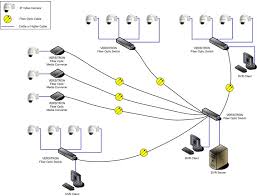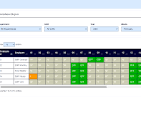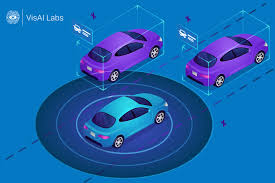IP Camera NVR: Enhancing Security with Advanced Surveillance Technology
In today’s digital age, ensuring the safety and security of our homes, businesses, and public spaces has become more critical than ever. With the advancements in surveillance technology, IP cameras and Network Video Recorders (NVRs) have revolutionized the way we monitor and protect our surroundings.
IP cameras, also known as network cameras, are digital video cameras that transmit video and audio data over an Internet Protocol network. Unlike traditional analog CCTV cameras, IP cameras offer higher resolution, improved image quality, remote accessibility, and advanced features such as motion detection and night vision.
When it comes to storing and managing the vast amount of footage captured by multiple IP cameras, Network Video Recorders (NVRs) play a crucial role. An NVR is a specialized device that records video data from IP cameras onto a built-in hard drive or external storage devices. It provides centralized management of camera feeds, allows for easy retrieval of recorded footage, and enables users to set up customized recording schedules.
The combination of IP cameras and NVRs offers several advantages over traditional surveillance systems. With remote access capabilities, users can view live camera feeds and playback recordings from anywhere using a smartphone, tablet, or computer. This flexibility is particularly beneficial for monitoring large properties or multiple locations simultaneously.
Furthermore, IP camera NVR systems support advanced features such as motion detection alerts, which notify users when unexpected movement is detected within the camera’s field of view. This proactive security measure helps in preventing potential threats or intrusions before they escalate.
Another notable advantage of IP camera NVR setups is their scalability. Users can easily expand their surveillance system by adding more IP cameras to cover additional areas without the need for extensive cabling or infrastructure upgrades. This flexibility makes IP camera NVR systems ideal for both residential and commercial applications.
In conclusion, the integration of IP cameras with Network Video Recorders offers a comprehensive surveillance solution that enhances security measures while providing convenience and flexibility to users. With their advanced features, high-quality video output, remote accessibility, and scalability options, IP camera NVR systems have become indispensable tools for safeguarding our environments in today’s digital era.
Top 5 Benefits of Using IP Camera NVR for Enhanced Security and Convenience
- High-resolution video quality for clear and detailed footage.
- Remote access capability allows users to monitor camera feeds from anywhere.
- Advanced features like motion detection alerts enhance security measures.
- Scalable system that can easily expand by adding more IP cameras.
- Centralized management of camera feeds and recordings for easy access and retrieval.
Challenges of IP Camera NVR Systems: Setup, Cost, and Security Concerns
- Initial setup and configuration can be complex for non-technical users.
- Higher upfront cost compared to traditional analog CCTV systems.
- Dependence on a stable network connection for optimal performance.
- Limited storage capacity may require additional investment in external storage devices.
- Vulnerability to cyber threats if not properly secured against hacking or unauthorized access.
- Compatibility issues with certain IP cameras or NVR models from different manufacturers.
High-resolution video quality for clear and detailed footage.
The high-resolution video quality provided by IP camera NVR systems ensures clear and detailed footage, allowing users to capture every aspect of their surroundings with exceptional clarity. This pro enables users to closely monitor activities, identify individuals, and review events with precision, enhancing overall surveillance effectiveness. Whether it’s monitoring a residential property, securing a commercial establishment, or overseeing public spaces, the superior video quality offered by IP camera NVR systems ensures that no detail goes unnoticed, providing peace of mind and reliable security monitoring.
Remote access capability allows users to monitor camera feeds from anywhere.
The remote access capability of IP camera NVR systems empowers users to monitor camera feeds from any location, providing unparalleled convenience and flexibility. Whether checking in on a home while away on vacation, keeping an eye on a business premises after hours, or overseeing multiple locations simultaneously, the ability to view live camera feeds and playback recordings remotely ensures that users can stay connected and informed about their surroundings at all times. This feature not only enhances security measures but also offers peace of mind and real-time monitoring capabilities that are invaluable in today’s fast-paced world.
Advanced features like motion detection alerts enhance security measures.
The advanced feature of motion detection alerts in IP camera NVR systems significantly enhances security measures by providing proactive monitoring and immediate notifications when unexpected movement is detected within the camera’s field of view. This capability allows users to stay informed in real-time about potential threats or intrusions, enabling them to take swift action and prevent security incidents before they escalate. By leveraging motion detection alerts, IP camera NVR setups offer an added layer of protection and peace of mind for users seeking to maintain a secure environment.
Scalable system that can easily expand by adding more IP cameras.
One of the key advantages of an IP camera NVR system is its scalability, allowing users to effortlessly expand their surveillance network by simply adding more IP cameras. This flexibility enables users to adapt their security setup to evolving needs and changing environments without the need for extensive rewiring or infrastructure modifications. Whether it’s covering additional areas of a property or enhancing monitoring capabilities in a commercial setting, the ability to scale up the system with ease makes IP camera NVR setups a cost-effective and practical solution for long-term security requirements.
Centralized management of camera feeds and recordings for easy access and retrieval.
One of the key advantages of using an IP camera NVR system is the centralized management of camera feeds and recordings, which allows for easy access and retrieval of footage. By consolidating all video data onto a single device, users can conveniently monitor multiple cameras from a unified interface and quickly search for specific recordings as needed. This streamlined approach to managing surveillance data not only simplifies the monitoring process but also ensures that critical footage can be easily accessed for review or evidential purposes.
Initial setup and configuration can be complex for non-technical users.
Setting up and configuring an IP camera NVR system can pose a significant challenge for non-technical users due to its complexity. The initial setup may involve tasks such as network configuration, IP address assignment, port forwarding, and software installation, which can be daunting for individuals without technical expertise. Understanding the intricacies of connecting multiple IP cameras to the NVR, configuring recording settings, and ensuring seamless communication between devices requires a certain level of technical know-how. This complexity in the setup process may deter non-technical users from fully utilizing the capabilities of an IP camera NVR system, highlighting a notable drawback for those seeking a user-friendly surveillance solution.
Higher upfront cost compared to traditional analog CCTV systems.
One significant drawback of IP camera NVR systems is their higher upfront cost when compared to traditional analog CCTV systems. The initial investment required for purchasing IP cameras and Network Video Recorders can be a barrier for budget-conscious individuals or businesses looking to upgrade their surveillance infrastructure. Additionally, the installation and setup of IP camera NVR systems may involve additional expenses related to network infrastructure and configuration, further adding to the overall cost. Despite the higher initial expenditure, it’s essential to consider the long-term benefits and advanced features that IP camera NVR systems offer in terms of enhanced security, remote accessibility, and scalability, which can outweigh the initial financial outlay over time.
Dependence on a stable network connection for optimal performance.
One of the drawbacks of using an IP camera NVR system is its dependence on a stable network connection for optimal performance. Since IP cameras transmit video data over an Internet Protocol network, any disruptions or fluctuations in the network connection can lead to issues such as video lag, buffering, or loss of footage. This reliance on a consistent and reliable network connection can pose challenges in environments where internet connectivity may be unstable or prone to interruptions, potentially compromising the effectiveness of the surveillance system. Users need to ensure a robust network infrastructure to maintain seamless operation and uninterrupted monitoring with IP camera NVR setups.
Limited storage capacity may require additional investment in external storage devices.
One significant drawback of IP camera NVR systems is their limited storage capacity, which may necessitate additional investment in external storage devices. As high-definition IP cameras capture more detailed footage and require ample storage space, the built-in hard drives of NVRs may quickly reach their capacity limits. This limitation can lead to the need for purchasing extra external storage devices, such as network-attached storage (NAS) or cloud storage subscriptions, to accommodate the growing volume of video data. The added cost of expanding storage capacity can be a consideration for users looking to scale up their surveillance system over time.
Vulnerability to cyber threats if not properly secured against hacking or unauthorized access.
One significant drawback of IP camera NVR systems is their vulnerability to cyber threats if not adequately secured against hacking or unauthorized access. With the increasing interconnectedness of devices and networks, IP cameras and NVRs can become potential entry points for malicious actors seeking to compromise security. Without proper encryption, strong passwords, regular software updates, and network monitoring, these systems are at risk of being exploited by hackers to gain unauthorized access to live camera feeds, recorded footage, or even control over the surveillance system. It is crucial for users to prioritize cybersecurity measures and implement best practices to protect their IP camera NVR setups from potential cyber threats and safeguard sensitive information.
Compatibility issues with certain IP cameras or NVR models from different manufacturers.
One of the drawbacks of IP camera NVR systems is the potential compatibility issues that may arise when using IP cameras or NVR models from different manufacturers. Due to variations in protocols, software, and technical specifications, certain IP cameras may not be fully compatible with specific NVR models or vice versa. This can result in limitations in functionality, unreliable performance, or the inability to integrate certain features effectively. It is essential for users to carefully research and ensure compatibility between their chosen IP cameras and NVR systems to avoid any issues and maximize the effectiveness of their surveillance setup.



